Spotlight Session 1
11:45 – 13:00
The Scottish Ambulance Service’s Role in Redesign of Urgent Care
The Scottish Ambulance Service (SAS) is present in every community in Scotland 24 hours a day, 7 days a week responding to 999 calls. These calls relate to a wide range of conditions, from immediate life-threatening emergencies through to calls from people concerned about symptoms or injuries that are manageable through non-emergency, urgent care pathways.
Their aim is to provide all patients with high quality person-centred care. To support this at the outset of the (COVID-19) pandemic, SAS adapted their delivery model to utilise the clinical skills of Advanced Practitioners by introducing remote clinical assessment and video consultation.
In this session, delegates will hear how this and other interventions in the Ambulance Control Centre (ACC) has resulted in the following:
- 24% of 999 calls being managed clinically without ambulance dispatch; and
- A further 20% of patients being further managed in communities post ambulance dispatch.
This represents a significant contribution to managing whole-system flow and taking pressure off Accident and Emergency Departments and the acute system.
The national Redesign of Urgent Care programme recognises the SAS role in pre-hospital urgent care and through work with the wider health and social care system, SAS can utilise community pathways as well as Flow Navigation Centres.
In this presentation, delegates will hear more about how the SAS are acknowledging the impact of the pandemic on mental health patients.
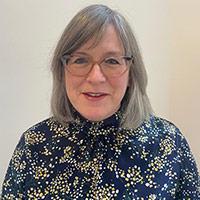
Julie King
Clinical Services Transformation Manager, Scottish Ambulance Service
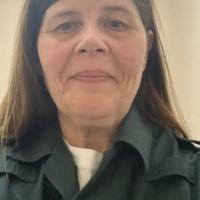
Alison Moggach
Interim Clinical Lead for North of Scotland, Advanced Practice, Scottish Ambulance Service
The Impact of Transition in and out of the (COVID-19) pandemic for Care Experienced Young People
Care experienced young people are some of the most vulnerable in society due to their experience of complex trauma, deprivation and multiple placement moves.
Recently, the Scottish government launched the Promise Implementation Plan to prioritise the needs of this group, with a focus specifically on care leavers and their health and wellbeing after they have left full-time education.
Historically, the continuity of health care services for care leavers has been difficult to sustain after they leave school. At this point they often disengage from health services and sometimes do not reconnect with health services until they access adult mental health, substance misuse or maternity services.
Throughout the (COVID-19) pandemic, NHS Tayside has been working hard to build service pathways with health and social work partners to build relationships with care leavers at 14 years and to offer ongoing health support until their 26th birthday.
In this presentation, delegates will hear how the nurses from the Care Experienced Young People’s Service (CEYPS) built and sustained relationships with young people during the pandemic and how this learning was used to further develop the service.

Julie-Anne Alexander
Nurse for CEYPS (Care Experienced Young People’s Service), NHS Tayside
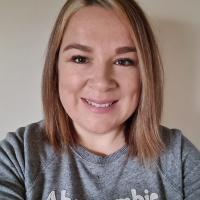
Sheonagh Reynolds
Nurse for CEYPS (Care Experienced Young People’s Service), NHS Tayside
SMS: CONNECT – The Creation of an Online, Award-winning, Self-Management Service for Children and Young People with Long-Term Health Conditions
The health and wellbeing of children and young people (CYP) lies at the heart of the work of Children’s Health Scotland.
For over ten years, Children’s Health Scotland has been successfully delivering a face to face Self-Management Service (SMS) to CYP living with long-term health conditions in Edinburgh and the Lothians (SMS:F2F). The programme supports participants to develop skills to cope with their condition including self-care, relaxation techniques, managing stress and building self-esteem and confidence.
In March 2020, SMS:F2F was paused due to COVID-19 restrictions. During this time, they became increasingly aware of CYP feeling isolated and experiencing poor mental health. Referral numbers soared and they realised that they had to explore how to continue to deliver their services in an accessible format. This lead to the creation of SMS: CONNECT, an online self-management programme for CYP with health conditions.
This presentation will highlight that by moving online, they were able to offer the service across Scotland and have now received referrals from ten NHS Boards. The outcome data collected demonstrates that SMS: CONNECT has had a significant impact on the CYP who have participated, particularly in building resilience.
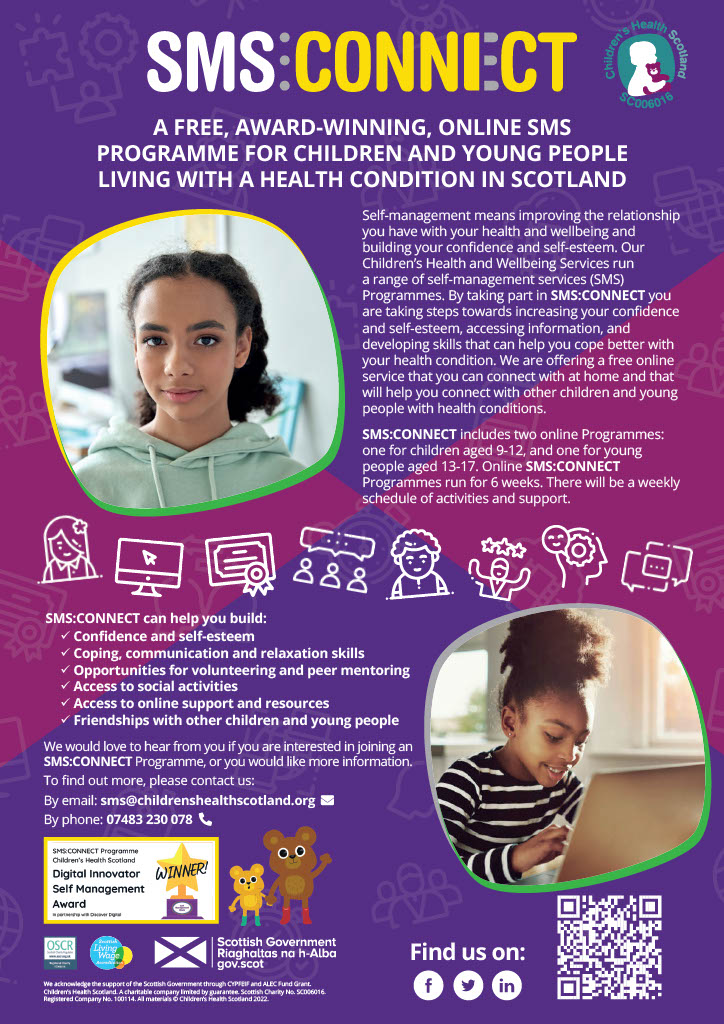
https://www.childrenshealthscotland.org/service/smsconnect/

Gill Sutherland
Head of Children’s Health and Wellbeing Service, Children’s Health Scotland
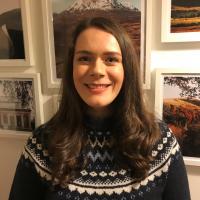
Beth Davidson
Children’s Health and Wellbeing Services Coordinator, Children’s Health Scotland